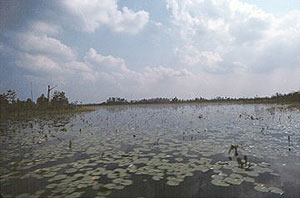
ATLANTA – It was jobs versus protecting a national environmental treasure Tuesday when a Georgia House subcommittee held a two-hour hearing on a proposed titanium mine near the Okefenokee Swamp.
Environmental advocates urged lawmakers to pass legislation banning surface mining along Trail Ridge near the Okefenokee. That’s where Alabama-based Twin Pines Minerals is seeking state permits to mine titanium oxide.
House Bill 71 failed to make last week’s Crossover Day deadline for bills to pass at least one legislative chamber to remain alive for this year’s General Assembly session. However, the measure boasts 91 cosponsors among the 180 House members and could be resurrected by being attached to another bill that is still before the legislature.
Rep. Darlene Taylor, R-Thomasville, the bill’s chief sponsor, urged her colleagues on the House Natural Resources & Environment’s Resource Management Subcommittee to give the measure a chance.
“The Okefenokee is one of the largest remaining intact freshwater ecosystems in the world,” she said. “It cannot be replaced. A miscalculation cannot be corrected.”
Rhett Jackson, a professor of hydrology and water resources at the University of Georgia, said the proposed mine would remove enough water from the drought-sensitive swamp to render it more susceptible to wildfires.
Other supporters touted the Okefenokee’s economic benefits as a popular tourist attraction. Michael Lusk, refuge manager at the Okefenokee National Wildlife Refuge, said the swamp draws about 400,000 visitors a year, is responsible for 955 jobs, and generates $24 million in annual economic impact.
The bill’s opponents said the mine, too, would provide an economic boost to an economically distressed area of the state. Twin Pines CEO Steve Ingle, in video testimony, said the mine would create 100 to 200 full-time jobs.
“Our county greatly needs large quantities of high-paying jobs,” said Drew Jones, a Charlton County commissioner. The commission has passed a resolution supporting the project.
Ingle said Twin Pines has pledged to restore the site with indigenous pines after the mining activity is completed.
“There’s no way we’d do anything to expose us to regulatory action or put our investment at risk,” he said.
The bill’s opponents also brought a hydrologist, Sorab Panjay, who told the subcommittee the amount of water the mine would remove from the swamp would be negligible and do no environmental harm.
Bill Sapp, a senior attorney with the Southern Environmental Law Center and chairman of the Okefenokee Protection Alliance, said it’s the General Assembly’s duty to “protect and preserve” the Okefenokee and not leave it to the discretion of the Georgia Environmental Protection Division (EPD), which is currently reviewing Twin Pines’ mining land use plan for the project.
But Lewis Jones, a lawyer representing Twin Pines, said it’s the EPD’s job to evaluate permit applications and approve them only if a project will not harm the environment.
“This rigorous process is only going to result in a permit if it can be shown mining can be done safely,” he said.
